Interview with UN Women Executive Director Phumzile Mlambo-Ngcuka
Date:
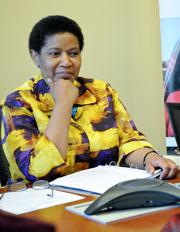
UN Women Executive Director Phumzile Mlambo-Ngcuka. Photo: UN Women/Catianne Tijerina.
A South African national, Ms. Mlambo-Ngcuka broke new ground in women’s leadership beginning with her term as founding President of the Natal Organization of Women starting in 1983 and through her tenure as the first woman Deputy President of her country, from 2005 to 2008. In 2008, she established the Ulambo Foundation to improve education in impoverished areas.
The UN News Services spoke to Ms. Mlambo-Ngcuka ahead of International Women’s Day 2014, celebrated on the eve of the 58th Session of the UN’s Commission on the Status of Women (CSW), which this year will kick off a review of the Beijing Action Plan for women’s advancement and discuss future goals for women following the 2015 deadline for the Millennium Development Goals (MDGs), which has shaped international development efforts since the year 2000.
UN News Centre: Ms. Executive Director, this is your first Women’s Day as head of UN Women. Can you give us some of your thoughts on what it means to you personally?
It is important that women celebrate themselves but also that they don’t only preach to the converted and go out there and win more allies for our struggle.
To me personally it means that I have come a long way. The opportunity to have been an activist meant that I was able to be hands-on in addressing and understanding the nature of gender oppression. I was able to be part of women’s organizations and to sharpen their agenda, to engage with institutions – also to gain by initiatives where, for instance, you campaign for representation of women and you don’t get what you want but in the process of campaigning you learn.
The moral of the story there is that it’s important to be involved and be engaged. Being involved also showed to me the importance of having men as part and parcel of the women’s struggle. And being part of Government where there was legislation that addresses women’s issues also was an important experience for me – you could see the impact and the ripple effect it has on women.
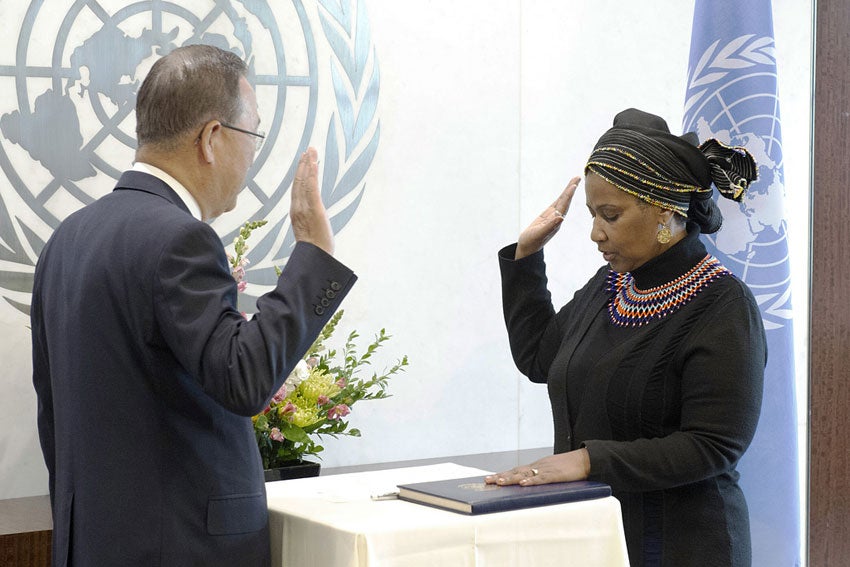
Phumzile Mlambo-Ngcuka is sworn in as new Executive Director of UN Women by Secretary-General Ban Ki-moon (August 2013). UN Photo/Evan Schneider.
UN News Centre: When you talk about activism you are referring to the campaign against apartheid in South Africa, is that right?
Phumzile Mlambo-Ngcuka: Yes, within the campaign against apartheid was also the campaign for gender equality. The struggle was about racism, but it also was about gender oppression and class oppression. The ability to look at all those things simultaneously is always important.
UN News Centre: Tell us about the advancements you celebrate today.
Phumzile Mlambo-Ngcuka: Well, it was women in the labour movement in the 1900s that gave us this day. They were calling for bread; they were calling for better working conditions and they were calling for peace. Guess what? We are calling for the same things today, in different ways. We are rededicating ourselves to the struggles of today. Today, for instance, we are calling for decent work because women continue to be at the bottom of the pyramid of economic activity and the work and the jobs that they do continue to be informal and to be low paid.
We are also calling for women to be given equal pay for work of equal value, but also women still do a lot of unpaid work at home: caring for the aged, caring for children and that means that women cannot go out in the labour market and be part of the formal economy. So we are still, in a way, campaigning for the same thing. Women are campaigning for peace in countries where there is conflict. Women are campaigning against violence against women, which also means that where women have experienced domestic violence at home and outside the home they are not at peace with themselves.
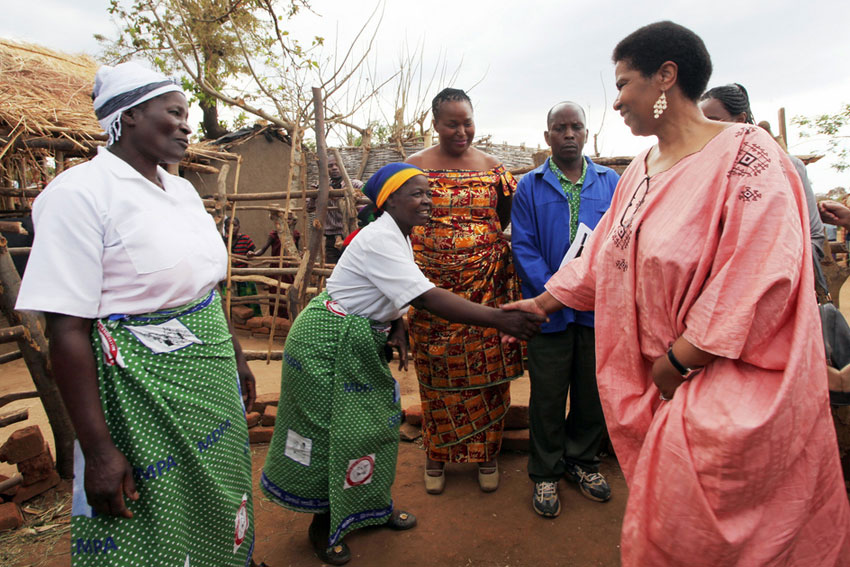
Ms. Mlambo-Ngcuka meets members of a women farmers group in the Lilongwe region of Malawi in October 2013. Photo: Maria Thundu
UN News Centre: The theme this year is “Equality for women is progress for all.” Could you explain that a bit for us?
Phumzile Mlambo-Ngcuka: Yes. Progress for women is progress for you, starting with yourself, because if more women were to finish secondary school, we would have much less infant mortality. We know today that if women farmers were to receive the same inputs – fertilizers, machinery – more people would be able to have food because food production would be much higher.
We also know that companies that involve women at a high level and engage them fully are much more competitive and profitable. As a matter of fact, amongst Fortune 500 companies, it has been argued that such companies are 34 per cent more competitive than their counterparts when it comes to returning profits to shareholders. So there’s actually measurable impact in terms of what it means to engage women fully. The situation changes for the better not just for women but for everybody affected.
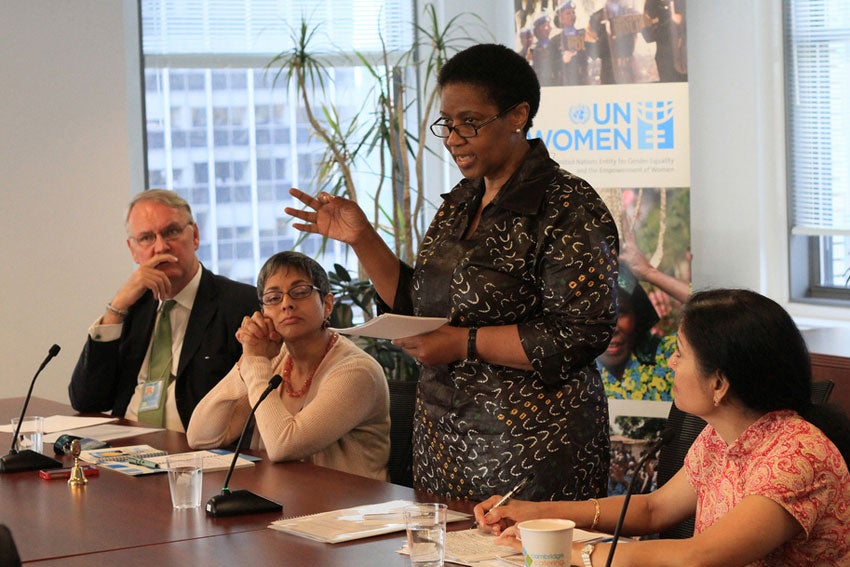
Executive Director Mlambo-Ngcuka meets with civil society partners based in New York. Photo: UN Women.
UN News Centre: Overall what is the current state of progress toward women’s equality?
Phumzile Mlambo-Ngcuka: It’s mixed. We’ve made progress, but it is very uneven. For instance, today we have got more women representation in Parliaments. We’ve moved in less than 10 years from one out of 10 Parliamentarians being a woman to one out of five. That still is less than what it should be, but it is progress nevertheless . At the same time, we have exceptional progress in countries like Rwanda, where more than 50 per cent of Parliamentarians are women. Obviously that is a unique case. You also have got more girl children in school, but the number of both boys and girls that are still out of school is at the same time exceptionally high. In workplaces you’ve got more women in senior positions, but again, the numbers are not where they should be. So it’s a mixed record.
UN News Centre: How will UN Women address obstacles to further progress?
Phumzile Mlambo-Ngcuka: Some are being addressed through our normative work – the policies that we advocate, the resolutions that we facilitate either in the Security Council or in the General Assembly, the legislation that this translates to at country level and the role that our country offices play in assisting Governments to implement legislation. Gender-responsive budgeting is something that we actively support Governments to do. We send experts to work in the relevant ministries in order to assist. We’re also a part of advocacy in different countries where there is, for instance, high violence against women we campaign in different ways that are consistent with what is possible to do in those countries.
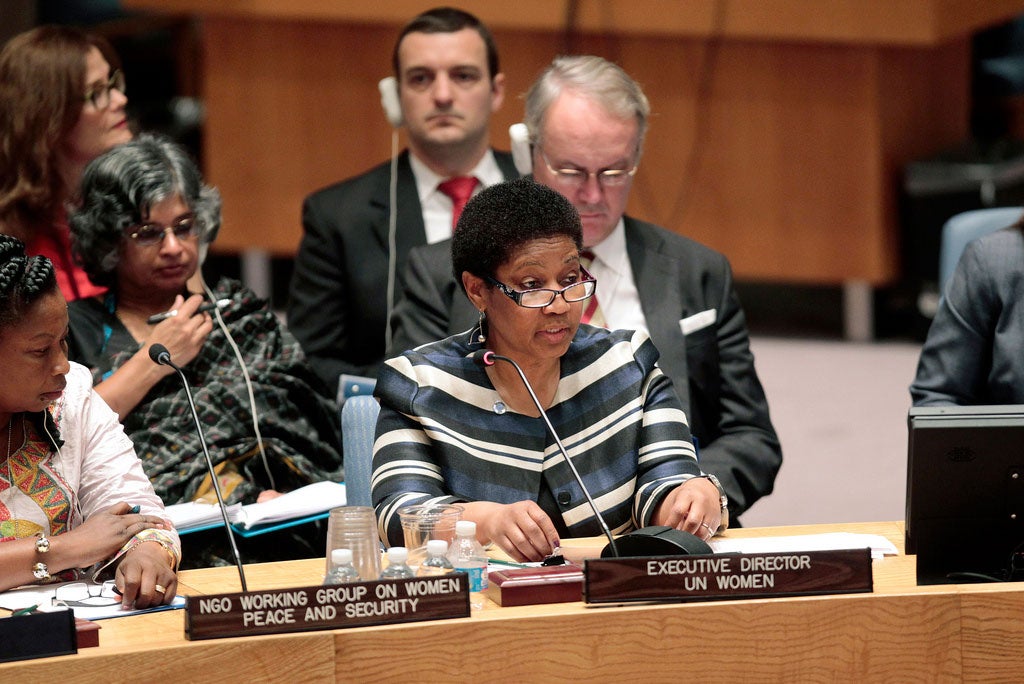
Ms. Mlambo-Ngcuka speaks during the Security Council's 2013 Open Debate on Women and Peace and Security. UN Photo/Paulo Filgueiras
UN News Centre: What impact do men’s attitudes and what is called "traditional values" have on your efforts?
Phumzile Mlambo-Ngcuka: Massive impact. Part of it is that we probably have not engaged men enough. The women’s movement has led the struggle, very bold, very courageous. But the change that is required– respect for human rights of women– is not just the responsibility of women alone. So we need to mobilize and to involve men. In the same way that you say women are more than half of the world population, men are the other half. We cannot leave that other half out.
We want men to own the problem. We are not asking them to assist us – they must do what they need to do in their own space. It is not about men joining women’s organizations suddenly, it is about men leading men’s organizations and making sure that they engage each other on their own attitudes. It is also about making sure that the men who believe in the equality of men and women are heard, that their voices are much louder than those who do not believe. We believe that the majority of men would prefer a better world , but some do not appreciate that progress for women is progress for all. So it is also about changing the narrative so that we constantly demonstrate that this is a struggle where everybody wins.
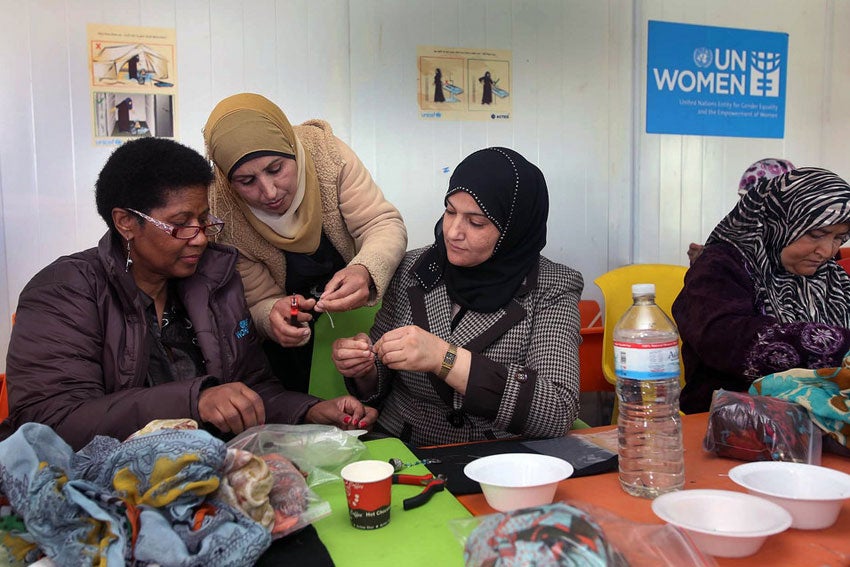
Executive Director Mlambo-Ngcuka visits Syrian refugees during her trip to Jordan, February 2014. Photo: UN Women
UN News Centre: As you are aware, the 20th anniversary of the Beijing Action Plan is also approaching. How will that be utilized?
Phumzile Mlambo-Ngcuka: What we need as a part of that process is for [Governments] to evaluate accurately what has worked in their own countries, what has not worked, what are the gaps and what is it that we need to do differently. And then, to make sure that we do even more work and it is much more directed to closing the gaps. We are asking countries to carry out national and regional evaluations and to come up with consolidated reports on the progress that they have made. And out of all the regions, we are going to pull together their reports and produce an apex report that shows us globally what has happened since we met in Beijing [in 1995] and what we could do better. We need to rededicate and focus on those areas. One would be violence against women.
UN News Centre: What should change in the post-2015 goals for women?
Phumzile Mlambo-Ngcuka: We can strengthen the rights aspect, which was not as strong as the development aspect in the MDGs. And make sure that we address the structural barriers to equality. Underlying structures continue to cause gender inequalities to recur notwithstanding how much work we do. We have not dedicated energy and policies to patriarchy, for example. It is not easy because it is about winning hearts and minds; it is about a value system. But we need to talk about these things and be much more intentional in challenging them, so that we do not have this recurrence. We also need to address the implementation of the legislation that affects the access to opportunities that qualitatively change the lives of women.
The Executive Director's video message for International Women's Day 2014. Credit: UN Women
UN News Centre: Finally, what would you say to a woman reaching adulthood about the current environment for women’s advancement? What advice would you give her?
Phumzile Mlambo-Ngcuka: I think that it is important that women grab the opportunities that are there. Young women must stay at school much longer. They must delay having children until they can afford to have and look after them. They must be assertive and not be afraid to talk and to engage, because this world belongs to them just as much as it belongs to men. In the one goal for gender equality that we are hoping will be part of the post-2015 agenda, we are hoping that young women will play a major role both as actors as well as people that will benefit from the new dispensation.
UN News Centre: And your main message for Women’s Day?
Phumzile Mlambo-Ngcuka: Well, I think that it is important that women celebrate themselves, but also it is important that they don’t only speak to each other, preach to the converted, that women go out there and we win more allies for our struggle.